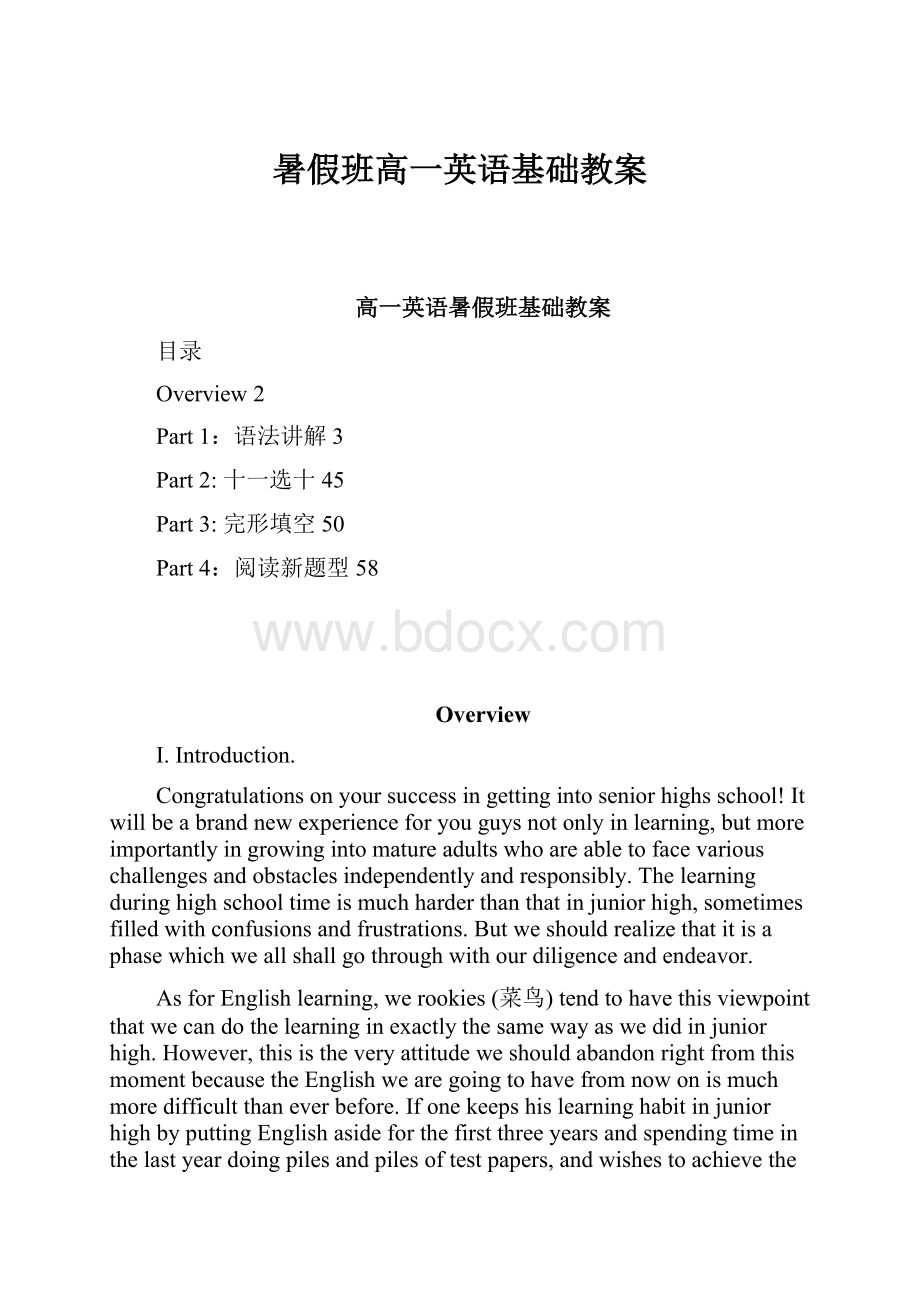暑假班高一英语基础教案.docx
《暑假班高一英语基础教案.docx》由会员分享,可在线阅读,更多相关《暑假班高一英语基础教案.docx(124页珍藏版)》请在冰豆网上搜索。

暑假班高一英语基础教案
高一英语暑假班基础教案
目录
Overview2
Part1:
语法讲解3
Part2:
十一选十45
Part3:
完形填空50
Part4:
阅读新题型58
Overview
I.Introduction.
Congratulationsonyoursuccessingettingintoseniorhighsschool!
Itwillbeabrandnewexperienceforyouguysnotonlyinlearning,butmoreimportantlyingrowingintomatureadultswhoareabletofacevariouschallengesandobstaclesindependentlyandresponsibly.Thelearningduringhighschooltimeismuchharderthanthatinjuniorhigh,sometimesfilledwithconfusionsandfrustrations.Butweshouldrealizethatitisaphasewhichweallshallgothroughwithourdiligenceandendeavor.
AsforEnglishlearning,werookies(菜鸟)tendtohavethisviewpointthatwecandothelearninginexactlythesamewayaswedidinjuniorhigh.However,thisistheveryattitudeweshouldabandonrightfromthismomentbecausetheEnglishwearegoingtohavefromnowonismuchmoredifficultthaneverbefore.IfonekeepshislearninghabitinjuniorhighbyputtingEnglishasideforthefirstthreeyearsandspendingtimeinthelastyeardoingpilesandpilesoftestpapers,andwishestoachievethesamedecentresultattheendofseniorhigh,hesurelywillfail,withoutexception.
TheEnglishlearninginseniorhighfocusesontheenhancementinvocabulary,grammarknowledge,andtheimprovementinreading,listeningandwritingskills.Ofcourse,speakingskillisalsoveryimportant.Therefore,ourmaintaskistograspalargevocabularystoreasquicklyaspossible(hopefullyabout2000ormoreinthefirstyear),andhaveagoodcommandofmostofthegrammaticalpointsinthefirstyears,andkeeppracticinginreadingandlistening.
II.Grammar.
高中阶段的语法部分主要分为:
(其中1-5在高一阶段学完)
1.句子的结构。
2.动词的时态和语态。
3.三大从句:
状语从句,定语从句,名词性从句。
4.三个非谓语动词:
不定式,动名词,分词。
5.情态动词。
6.倒装句。
7.虚拟语气(高考不要求)
III.高考题型
1.听力:
短对话*10;短文2篇*6;长对话填空*8
2.语法填空*16
3.十一选十*10
4.完形填空*15
5.阅读4篇,A-C为选择*12;D为回答问题*4
6.整句翻译*5
7.导向性作文,字数不少于150字。
Part1:
语法讲解
本次暑期班的语法讲解为:
句子结构,动词时态,动词语态,情态动词,状语从句,定语从句。
Section1:
句子结构。
1.简单句的分类
英语的简单句分为5种基本句型,句子再长,句子中的这些主要成分还是这5类。
(1)主语+谓语:
Iwaitedandwaited.Shecame.我等了又等。
她来了。
(2)主语+谓语+宾语:
Iatethreehamburgers.我吃了3只汉堡。
(3)主语+谓语(系动词)+表语:
MynameisDavid.Iamateacher.
(4)主语+谓语+宾语+宾补:
EveryonecallsmeDavid.大家都叫我大卫。
Wefoundthehallfull.我们发现礼堂坐满了。
(5)主语+谓语+间接宾语+直接宾语
Myteachergavemeabookyesterday.=Myteachergaveabooktomeyesterday.
2.定语:
形容词,-ing动名词/分词,-ed分词以及从句都可以做定语。
(1)highmountain,deepsea,bluesky
另外,形容词作定语也可以放在被修饰的后面,例如
(2)。
(2)somethingnew,anythingelse(像something这类不定代词,定语必须放在后面)
(3)themanstandingthere,theboystaringatthesky(-ing分词作定语)
(4)aguycalledJohn,thepicturetakeninShanghai(-ed分词作定语)
(5)Anythingthatcangowrongwillgowrong.(定语从句)
3.状语:
表示状态的词,词组,-ing分词,-ed分词或从句。
(1)NowadaysmanypeoplefancyAppleproducts.现在许多人都喜欢苹果的产品。
(2)Heisrunningveryfastontheplayground.他飞快地在操场上跑。
(3)Hearingthenews,thewholeclasswerewildwithjoy.到了这个消息全班兴高采烈。
(4)LocatedatthecenterofPeople’sSquare,ShanghaiGrandTheaterisregardedasoneofthesymbolsofShanghai.
上海大剧院坐落在人民广场的中心,它被认为是上海的标志之一。
II.Practice.
a.选出下列句子中的主语。
1.TohaveourhaircutbeforetheSpringFestivalisatraditionalcustominChina.
ABCD
2.Retiringfromthejobforalongtimemakesmyfatherhaveasenseofloss.
ABCD
3.Itissaidthatthefamousprofessorisgoingtogiveusalecturethisafternoon.
ABCD
b.选出下列句子中的宾语。
1.Howmanybooksanddictionariesdoyouhaveinyourbookcase?
ABCD
2.Weshouldavoideatinghigh-fatfoodinordernottodamageourhealth.
ABCD
3.Ladiesandgentlemen,pleasefastenyourseatbelt.Theplaneistakingoff.
ABCD
c.选出下列句子中的表语。
1.Usingbodylanguageproperlyingreetingswillmakepeoplefeelwelcome.
ABCD
2.Itbecomesacommonsensethatlawscan’talwaysprotectvictims.
ABCD
3.Itissaidthatthedormitoryroomsonthefifthfloorareours.
ABCD
d.选出下列句子中的定语。
1.Hemadeaspeechtoexpresshisideastothepeoplepresentintheregularmeeting.
ABCD
2.TalkinginEnglishaspossibleasyoucanisconsideredthebestwaytolearnEnglishwell.
ABCD
3.Shefeelsthereisanunfairtreatmenttowardfemaleemployeeswhoworkforthecompany.
ABCD
4.Itisveryhardforapersonlackingcouragetoopenanewwayinhiscareer.
ABCD
e.选出下列句子中的状语。
1.ThatAfricancountryisknowntowinitsindependencein1970.
ABCD
2.Theglobaltemperatureisrisingby1%everyyearasaresultofthegreenhouseeffect.
ABCD
3.Wehavedecidedtobelieveinyouwithouthesitationwhatevertheysayaboutyou.
ABCD
f.选出下列句子中的宾语补足语。
1.Thebankwasfoundrobbedbyagroupofarmedmenearlyinthemorning.
ABCD
2.Thewitnessclaimedthathesawthesuspectclimbingupintothewindowatthattime.
ABCD
Section2.动词时态
1.一般时:
do,did,shall/willdo,woulddo
2.进行时:
isdoing,wasdoing,willbedoing,wouldbedoing
3.完成时:
havedone,haddone,willhavedone,wouldhavedone
4.完成进行时:
havebeendoing,hadbeendoing
willhavebeendoing,wouldhavebeendoing
I.一般时
1.现在时(do)
1.1按计划或安排要发生的动作
come,go,start,begin,end,leave,arrive,sail,setoff等。
(1)Ileavetheretomorrow.这里可以用将来时,也可以用现在时。
(2)TheshipsailsonSunday.本船周日出航。
1.2下列句型中的从句用现在时
ensurethat,makesure/certainthat,seetoitthat(确保);takecarethat(留意)
(1)Make/Besure(确认)thatallthewindowsareclosedbeforeyouleavethehouse.
出门前你要确认所有窗户都关掉了。
(2)Pleaseseetoitthatthereportisfinishedontime.请确保准时完成报告。
2.过去时(did)
2.1时间状语yesterday,theotherday,lastweek/month/year,once,onceuponatime,then,atthattime等连用,或者用usedtodo/woulddo。
(1)Heusedto/wouldwalktotheschooleverymorningwhenhewasathighschool.
他上高中时每天早上走去上学。
usedto和would都表示过去经常作某事,但是usedto表示现在不再这么做了。
(2)Hewouldgoforawalkintheparkaftersupper.晚饭后他通常去公园散步。
2.2已经终止了的动作
(1)Whoputthisdirtyshirtonthecouch?
是谁把这件脏衣服放在沙发上的?
(2)---Oh!
Youspilledwateronmyshirt.---Sorry,Ididn’tnoticeyou.
---啊!
你把水泼到我衣服上了。
---不好意思,我没看到你。
2.3连续的几个动作
(1)Maryenteredtheroom,switchedonthelights,andturnedontheTV.
2.4已经去世的人的情况
(1)Einsteinwasoneofthegreatestscientistandphysicistinhumanhistory.
爱因斯坦是人类史上最伟大的科学家和物理学家之一。
2.5before,after状语从句的前后可以同时用过去时
(1)Heateabighamburgerbeforehewenttobed.睡觉前他吃了一只大汉堡。
(2)Shewenttothepostofficeaftershelefttheshop.离开上电后她去了邮局。
2.5虚拟语气
(1)Itistimethatyouwenttobed.
(2)IwishIhadn’tsoldmycar.NowIcanonlywalktothecompanyeverymorning.
(3)---ShallIgototakethemailnow?
---Iwouldratheryoudidn’t.
3.将来时(shall/willdo)的表达方法
3.1begoingtodo,它与shall/willdo有以下区别:
(1)shall/willdo强调客观事实或临时决定,begoingtodo强调计划打算要做的事情
Theweatherforecastsaidthatitwillrainalldaytomorrow.(客观事实)
Thisboxistooheavyforyoutocarry.Iwillhelpyou.(临时决定帮助)
Iamgoingtoattendthemeetingthisafternoon.(本来就打算好的)
(2)shall/willdo强调主观推测会发生,begoingtodo强调客观判断会发生。
Itisbelievedthattheinflationwillnotendthisyear.人们相信通胀在今年不会结束。
Lookattheseblackclouds.It’sgoingtorainsoon.看这些乌云啊,马上就要下雨了。
3.2一般现在时,同1.2。
(1)ThetrainleavesforBeijingat6p.m.火车晚上6点出发开往北京。
3.3现在进行时,表示按计划或即将发生,句中用时间状语。
(1)Theyaregettingmarriednextmonth.他们下个月要结婚了。
常用于come,go,arrive,drive,fly,travel,leave,move,return,start,begin等动词。
(2)WearedrivingtoNanjingforatripnextmonth.我们准备下个月开车去南京旅游。
(3)SheiscomingherenextweekandisstayingtillMay.她下周来,要待到五月。
3.4betodo的几种含义。
(1)计划,安排:
ObamaistopayanofficialvisittoChinanextmonth.
(2)命令,指示:
Youaretostayathometillwecomeback.
(3)“如果要…就必须…”:
Ifyouaretosucceed,youhavetoworkhardenough.
3.5beabouttodo表示马上要发生的动作。
(1)Youareabouttoseethebiggestspiderintheworld.
(2)Themovieisabouttostartsoon.Let’shurryup.
4.过去将来时(woulddo)
4.1was/weregoingto表示意图,也可以表示计划没有实现。
(1)Iwasgoingtoplaybasketballwithmyfriendsyesterdayafternoon.
(2)Weweregoingtotakeawalkinthepark,butitrained.
II.进行时
1.现在进行时(isdoing)
1.1近阶段或暂时一直在进行的事情,常与lately,recently等连用。
(1)IamwritinganarticleconcerningEnglishlearningthesedays.
这两天我在写一篇关于英语学习的文章。
(2)Heisworkingonanimportantprojectlately.他最近正在做一个重要的项目。
(3)Thestudentsarehavingthefinalexamsthesedays.这两天学生们正在期末考试。
1.2表示抱怨批评的语气。
此类语气的副词有:
always,constantly,continually,forever,etc.
(1)Youarealwaysthinkingofonlyyourself.你老是只为自己着想。
(2)比较两句话:
Healwaysplaysvideogamesaftersupper.
Heisalwaysplayingvideogamesaftersupper.
1.3静态动词用现在时不用进行时。
(1)be,seem/appear,exist,remain,depend,matter,mean,deserve,concern(状态)
(2)have,own,possess,belongto,contain,consistof,hold,include,lack(拥有)
(3)like,love,admire,appreciate,dislike,hate,need,prefer,envy,(情感)
(4)think,believe,agree,approve,meanto,expect,guess,suppose,hope,want,intendto,know,understand,doubt,forget,mind(思想状况)
但是,以上有些动词同时也是动态动词,因此也可以使用进行时。
e.g.,Idon’tthinkwewillmakeitthistime,soI’mthinkingofanothermeans.
我认为这次我们不会成功的,所以我正在思考其它方法。
Heisalwaysveryrational,butthistimeheisbeingtoounreasonable.
他总是非常理智,但是这次他却太不讲道理了。
2.过去进行时(wasdoing)
2.1表示过去某一个具体时刻正在进行的动作
(1)Whatwereyoudoingatninelastnight?
(2)Atthattimeyesterdayhewasdoinghishomework.
2.2委婉的请求,仅限于hope,wonder,think,want。
(1)Iwashopingthatyoucoulddothisfavorforme.我希望你能帮我这个忙。
(2)Iwaswonderingifyouwouldliketogotograbacupofcoffeenow.
我想邀你一起喝咖啡。
(求约会)
3.将来进行时(will/wouldbedoing)
3.1将来某个时间一直要进行的动作。
(1)Whatwillyoubedoingthisafternoon?
你下午准备做什么?
(2)IwillprobablybewatchingTVtonightifthereisnothingelsetodo.
如果晚上没其它事干,我可能就在看电视